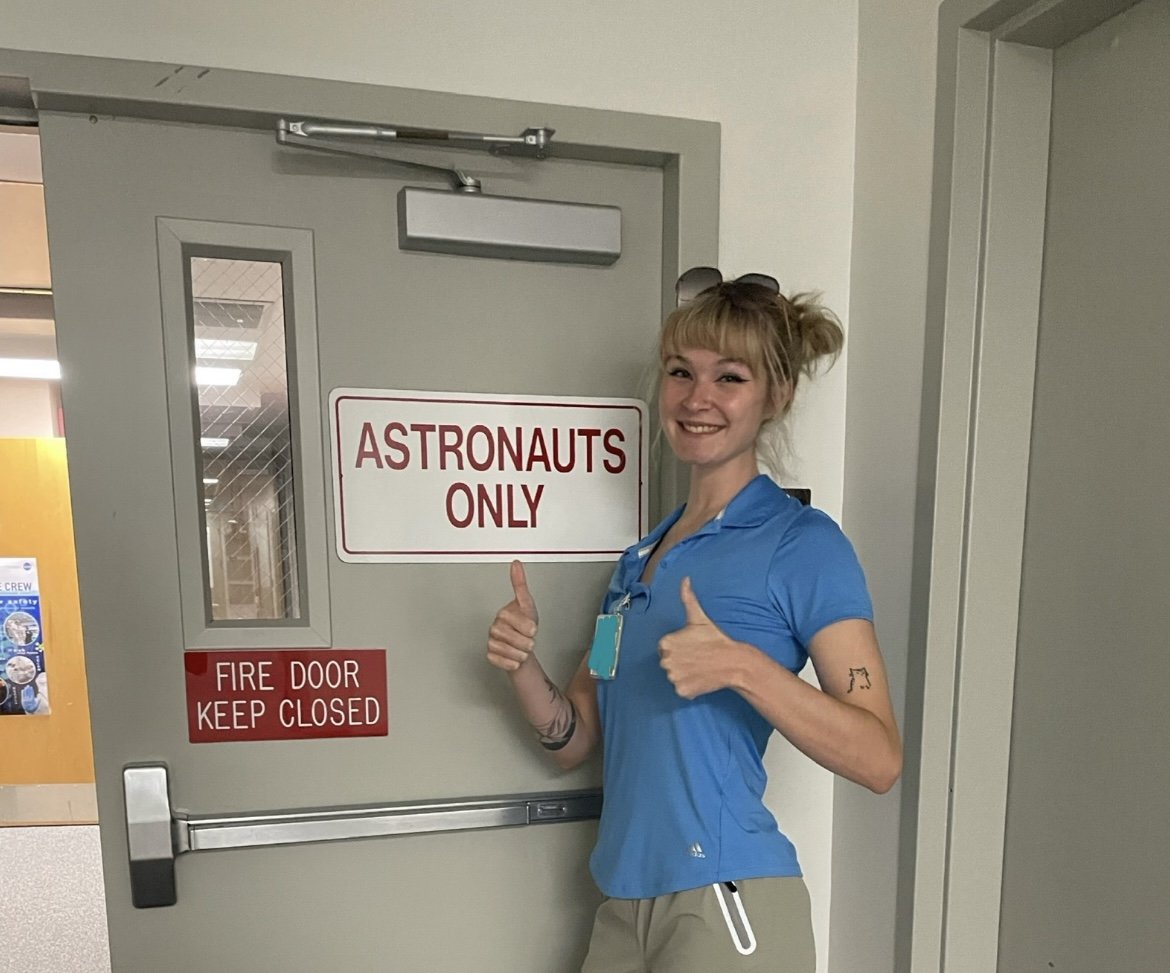Building a Healthier Workforce With Morgan Wagner ’21, MSAT ’24
Morgan Wagner ’21, MSAT ’24, shoots two thumbs up outside astronaut crew quarters at NASA’s Kennedy Space Center, where she interned in the spaceport’s rehabilitation works. (Courtesy of Morgan Wagner).
Athletic trainers often treat patients to help them return to the sport they love. Morgan Wagner ’21, MSAT ’24, had a patient who wanted to get back to rock climbing.
He was also a snowboarder, a wake surfer, and an engineer at NASA, where he worked on the devices that launch rockets into space.
Although she’d never climbed a mountain or hit the slopes, Wagner could relate to his pain.
“I understand what it’s like to have something in your life squandered because you have a physical disability or an inability to do something,” she said. “I think I see myself in my patients, and I also see them and their concerns.”
When she came to Chatham University as an undergraduate studying exercise science, she had a labral tear in her hip. It had caused her pain for years, and it wasn’t just hampering her ability as a track-and-field athlete.
“It was really interfering with my daily life,” she said. “I couldn’t sleep at night, I couldn’t perform at the level I wanted to perform because of the pain.”
After previous diagnoses and physical therapy provided no relief, Wagner was evaluated by the athletic trainers at Chatham, who correctly identified the source of her pain. Once she received a diagnosis at the end of her first year, she went into surgery during the next.
“When I woke up from surgery, I was in less pain than when I went under,” Wagner said. “It was a pretty significant thing for me, going from years and years of pain affecting my physical and mental health, to waking up and feeling like my world was just changed.”
The experience made it clear to her that athletic training was something she wanted to do. The culture of the program and her interactions with Chatham’s staff trainers reinforced that.
“It’s a very open place to be,” she said. “The athletic trainers encourage you to really be yourself, because that’s how they get to know you and can tell if something is wrong or something is bothering you.”
Before she began the Master of Science in Athletic Training program, Wagner worked different jobs and began to consider what type of trainer she wanted to be. She knew she didn’t want to work with professional or college athletes, nor did she want to work with young children.
She started to explore the possibility of being an industrial athletic trainer. “My true passion is helping the working population and building a healthier workforce,” she said.
One evening, Assistant Professor of Athletic Training Mindi Hilborn sent Wagner a link to apply for NASA’s athletic training internship. Not only would this provide Wagner with her immersive rotation, where students perform the type of job they want to apply for after graduation, but it would give her a rare opportunity to work at Kennedy Space Center in Florida.
It seemed like a great fit for Wagner given her background in science and technology.
“Our professors truly get down to knowing us, and they knew I did not want to be a traditional athletic trainer. I wanted to pursue those more niche avenues,” Wagner said.
Wagner takes a selfie outside the doors where astronauts sometimes pose before traveling to the launch pad before space flight. (Morgan Wagner)
She worked four days a week in NASA’s rehab works and, on Friday, spoke with the other athletic trainers about their caseloads, breaking down what they needed to do to best care for their patients.
Those patients could be nearly anyone working for NASA, except for astronauts (Wagner said they received specialized care). Some of them had back pain, knee replacements, recent shoulder surgeries, and other joint injuries.
She spent a long time working with that rock-climbing, snowboarding, wake-surfing engineer. He had a torn meniscus in his knee.
“It was really challenging for me to rehab him back, because those are pretty niche sports that he wanted to get back to that I’ve personally never done before,” she said. “He also had needs as someone who worked for NASA that I had to work around.”
Wagner had success restricting blood flow to his legs by putting a band around his thigh and doing exercises. Then, she tried to create challenges that would simulate the sports he wanted to do.
“He loved snowboarding, so I’d be using a balance board and pretend like he was snowboarding down a slope, and I’d tell him, ‘There’s a tree there, you’ve got to go left!’” she said.
Once he was stronger, there was one thing left to do. Since his rehabilitation began, Wagner’s patient had been asking her to join him at an indoor rock climbing park. Now that he was no longer her patient, she obliged.
“He got to see the fear of God in my eyes when I had to repel back down, and I didn’t trust the rope,” she said.
When she graduates in April, she’ll be doing industrial athletic training with construction workers in Boston, where she hopes to help build worker health.
“I have a bit of knowledge about construction, because of my father,” she said. “I kind of know what injuries to expect and how to start with a prevention program. I’m really excited.”
Explore Chatham’s Bachelor of Science in Exercise Training and Master of Science in Athletic Training programs at chatham.edu.


